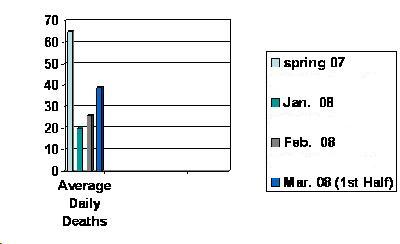General David Petraeus is quoted in WaPo as saying that no one, American or Iraqi, thinks that there has been sufficient political progress in light of the reduction of civilian deaths since last fall. The US troop escalation, the strategy of paying Sunni guerrillas to join pro-US Awakening Councils, and the cease-fire with the Mahdi Army have brought down the grisly daily death toll from an average of 65 a day in the apocalypse that followed the February 2006 bombing of the Golden Dome in Samarra to between 20 and 40 a day more recently (it was 20 in January, 26 in February and 39 in the first half of March):

The first half of March has been disappointing with regard to casualties. There have been several big bombings in Baghdad, and over a dozen US troops have been killed in the past week. In fact a few weeks ago the Sunni Arab guerrillas blew up a meeting of the al-Anbar Awakening Council in Baghdad itself right under the nose of the US military. It is possible that the Sunni guerrillas had lain low during January, keeping their powder dry, with the intent of embarrassing Gen. Petraeus in his April congressional testimony. It is also possible that the various techniques the US military has deployed to reduce violence have reached their limit of effectiveness in the face of an ever-adapting enemy. And after all, the Sunni Arabs now have even more to avenge, since quite without meaning to the American surge somehow allowed a massive ethnic cleansing of Sunnis from Baghdad, with about a million of them now penniless and homeless in Damascus.
But despite these controversies about the military side, Gen. Petraeus has certainly had successes. And he is clearly frustrated that they have not been taken advantage of by the Iraqi political elite. And my strong suspicion is that the US officers in Iraq are also frustrated with the White House for not pushing the Iraqis harder on a political settlement. It is very hard to see what Bush’s political strategy is in Iraq. The “surge” was never meant to be the objective but rather the means.
Gen. Petraeus isn’t specific, but I can give some examples. The Sunni Arab Iraqi Accord Front withdrew from the al-Maliki ‘national unity’ government last summer. The IAF is a coalition of three parties. Two of them say they are uninterested in coming back into the government. The third, the Iraqi Islamic Party, led by vice president Tariq al-Hashimi, is said to be seriously considering returning. Nothing has happened so far. In other words, it is still the case that al-Maliki’s government is less successful at reconciliation with the Sunnis now than it had been last year this time before the surge had made much of an impact.
Sunni Arab provinces such as Diyala, Salahuddin and Mosul are still violent, and even al-Anbar, which has settled down, is not paradise. The Awakening Council model does not seem to have been successful outside al-Anbar and some Baghdad neighborhoods, and there is always the danger that the US is creating a powerful Sunni militia that despises Prime Minister al-Maliki as Iran’s cat’s paw.
The Kurdish-Arab struggles in the north, the issue of Kirkuk, the terror activities of the Kurdish Workers Party (PKK)– based in Iraq but hitting NATO Turkish troops in eastern Turkey– and the Turkish incursions into and bombings of Iraqi Kurdistan, signal that the north is a powder keg. The unresolved issue of oil-rich Kirkuk and whether it will accede to the Kurdistan Regional Government is the other shoe in the Iraq crisis, which has not yet dropped but could at any moment. I have been told that Gen. Petraeus deeply disagreed with Bush’s decision to share real time intelligence on the PKK with the Turkish government and to allow a major Turkish incursion into and bombing of northern Iraq.
Likewise, the Islamic Virtue Party (Fadhila) withdrew from the al-Maliki government last year. It controls the provincial administration of Basra. Its rival, the Islamic Supreme Council of Iraq, staged a 5000-strong demonstration against the provincial government last week. Having bad relations between the federal center and the province of Basra is not good for Iraq, because Basra is the country’s biggest export route, including for petroleum, which generates 90% of government revenues.
So you could understand how Gen. Petraeus, having sacrificed so much to get some sort of social peace in Baghdad that would allow some major steps toward political reconciliation, is frustrated that no such major initiatives have been launched and that Iraqi politics just seems to be stuck.
It is worthwhile mentioning that what Gen. Petraeus said about the lack of political progress is the opposite of what John McCain has been saying. I am not saying that the contradiction is intended to be a political statement. But I am saying that Petraeus has just revealed himself again to be a straight shooter of a sort that has been all too rare in the Iraq misadventure.
===
On another topic, see Barnett Rubin on an integrated strategy for Afghanistan.



 © 2025 All Rights Reserved
© 2025 All Rights Reserved